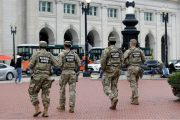
Potential gun buyers in California now have one less hurdle to leap before they can purchase a firearm. They are now free to purchase as many as they desire — providing of course that they meet the state’s other highly restrictive laws.
Last Wednesday, a three-judge panel of the 9th Circuit Court of Appeals heard the state’s appeal of a district court’s ruling from March declaring that the state’s one-gun-purchase-per-month was unconstitutional. The next day, it reversed its previous hold on the district court’s ruling, allowing Californians now to purchase more than one firearm a month.
Brandon Combs, president of the Firearms Policy Coalition (FPC), which aided plaintiffs in the suit Nguyen v. Bonta, was pleased:
This order allows our hard-won injunction to take effect and, unless the 9th Circuit issues a new stay, Californians may now apply to purchase multiple firearms within a 30-day period.
FPC intends to make Governor Gavin Newsom and Attorney General Rob Bonta respect Second Amendment rights whether they like it or not.
Long History of Violating the Second Amendment
Newsom and Bonta and their anti-gun, anti-Second Amendment predecessors have long infringed on the state’s citizens’ constitutional rights. A potential purchaser must first obtain a Firearm Safety Certificate, costing $25, and submit his or her personal information in an application to the state for permission. He or she must then pass a written test proctored by a state-certified instructor. Having leapt those hurdles, the purchaser must then wait 10 days to take ownership of the purchased firearm. And magazines to feed that firearm must not contain more than 10 rounds of ammunition.
The law in question had its genesis in 1999, when state legislators imposed a one-per-month limit on handguns. In 2019, lawmakers amended that law to include what they erroneously but deliberately continue to refer to as “assault weapons,” namely semiautomatic rifles.
In 2020 the FPC filed suit against the infringement. The district court ruled that the California law was clearly unconstitutional under the new judicial landscape crafted by the Supreme Court in Bruen. Judge William Hayes made short shrift of the law in his 24-page ruling, declaring that “defendants [the state of California] have not met their burden of producing a ‘well-established and representative historical analogue’ to the OGM [one-gun-a-month] law. The court therefore concludes that Plaintiffs [FPC, et al.] are entitled to summary judgment as to the constitutionality of the OGM law under the Second Amendment.”
However, he allowed the infringement to remain in place for 30 days to give the state time to appeal. The appeals court extended that hold until Wednesday, when the three-judge panel heard the state’s arguments.
California’s Arguments Weak
Those arguments were flimsy and weak. Not surprisingly, they echoed the plaint from the notoriously anti-gun group Giffords that allowing citizens the right to purchase as many firearms as they wish at any time somehow enabled criminals access to firearms through “straw purchases.”
The state argued that the one-firearm-per-month restriction wasn’t really an infringement. Why? It had little to do with the right to “keep and bear arms,” but only with buying them in quantity. The state also expressed that “unprecedented social concerns” over gun crime in the state “did not exist during the Founding or Reconstruction eras to the same extent that they exist today.”
[T]hroughout history, legislatures have regulated firearms transactions to ensure that firearms did not end up in the hands of those who could not lawfully possess them. California’s restrictions impose comparable (or lesser) burdens to those historical precursors, and are comparably justified.
Attorneys for California claimed the law would deter “bulk purchases” of firearms that could “facilitate firearms trafficking to criminals.” This, of course, is the tired mantra offered by Giffords:
Laws limiting the number of firearms a person can purchase within a certain timeframe help reduce the number of guns that enter the secondary market—weapons that are more likely to wind up at the scene of a crime.
Only a handful of states limit bulk gun purchases, a policy that has been proven to reduce gun trafficking and consequently gun violence.
Connecticut limits its citizens to just three handgun purchases a month. Maryland, New Jersey, and Virginia each make it unlawful for a citizen to purchase more than one handgun a month. New York City goes even further, limiting firearm purchases to one handgun and one rifle or shotgun every 90 days.
A Favorable Ruling Could Set Precedent
If the appeals court rules that the district court got it right — that the one-gun-per-month restriction is in fact unconstitutional — it would create precedent that FPC could use in its war to push back similar Second Amendment infringements across the land.
Related Article:




